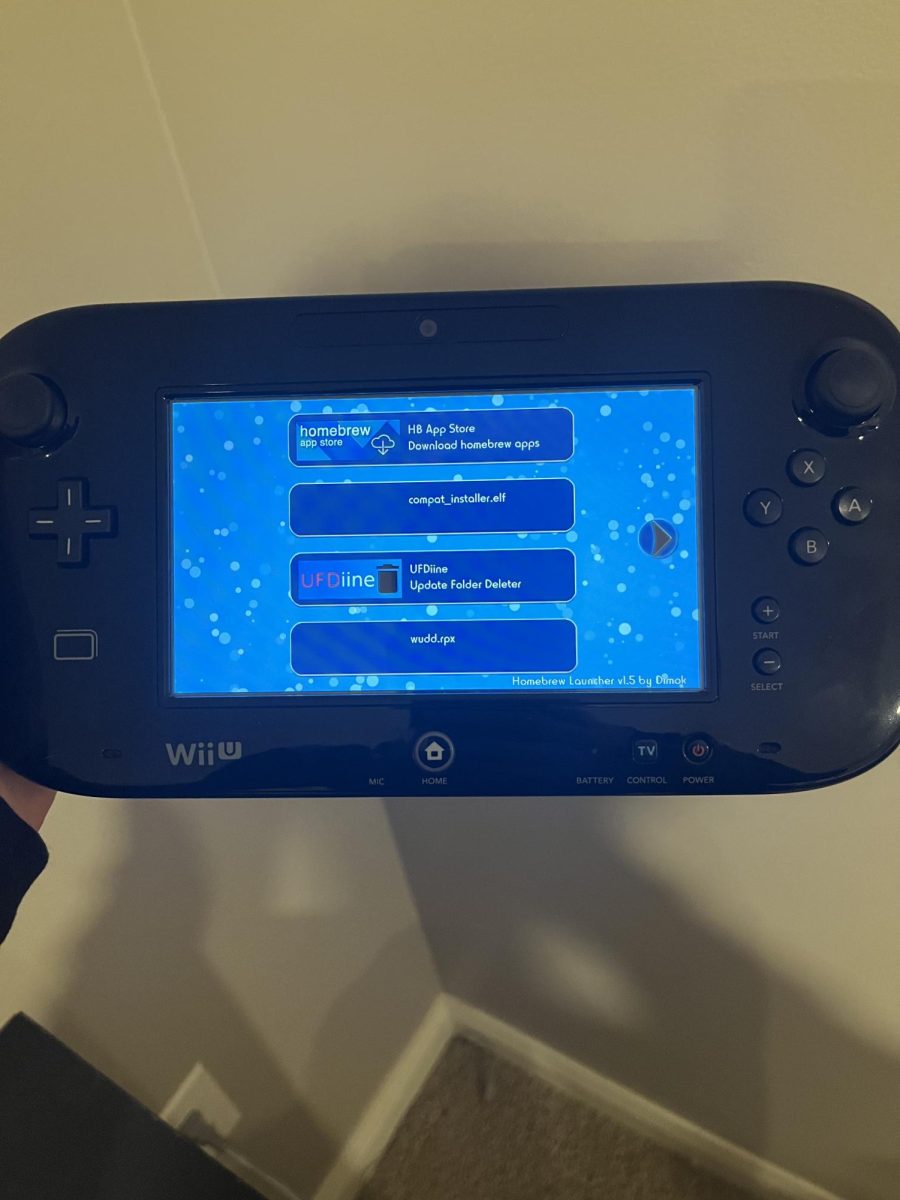
Troy Tomson
A “homebrewed” Wii U, like the one shown here, can make backups of games to download and play on a computer, but can just as easily be used for piracy.
Piracy is the theft of copyrighted material and thus illegal, but preserving the media of the past is also important. Preservation shows how far we’ve come, and it allows forgotten films, music and video games to get a second chance.
Although specific figures are hard to track, the US economy loses approximately $40 billion in film, and billions more in music and video games to piracy.
Film piracy is still done through unreliable websites and torrenting, but now IPTV and illegal streaming services for both film and music make up over 80% of piracy web traffic. These streaming services offer very low prices because they distribute media without purchasing the licensing to do so.
Piracy isn’t just done using suspicious streaming services, IPTV or malware ridden Russian websites. Sneakernet piracy seems innocent and can even stem from a legal purchase. However, copying a song or “ripping” a DVD for a friend leads to an uncountable dollar loss for artists and directors who make media that is illegally consumed. But amid concerns of piracy also comes the need to preserve media.
There is a big difference between pirating small, independent films and big budget ones. Senior Jadon Kachappilly said, “I think that it depends on what someone is pirating. It’s worse to pirate indie films, because the creators are dealing with very small margins. Big budget films have much larger margins, so piracy doesn’t hurt them as much.”
However, indie films, being mainly unrecognized, may actually benefit from piracy. These films generally have a much smaller reach, and are thus more susceptible to being lost to history. Piracy ensures the film will live on as long as it is digitally available.
PV graduate Isaiah Steele recently bought a server computer to back up DVD movies from his childhood, and access his database from anywhere. “Ripping content from a DVD that you own is not piracy. That is clear in US law — you are merely consuming the media you own in the mode you want. I believe that all piracy is bad, but I struggle to fault those who do pirate things. It is not uncommon for streaming services to do things like remove the content you ‘bought,’ from the service, making it impossible for you to watch the content you thought you bought,” Steele said. People like Steele are essentially recreational archivists, preserving the media that they own, and this media could be re-found decades, perhaps even centuries later.
Websites like archive.org tread a fine line between piracy and preservation. On the site can be found millions of songs, TV shows, movies and software like old, unsupported versions of Windows and Linux. While it is generally meant for preservation, the site has come under fire many times for allowing the collection, storage and distribution of copyrighted material.
Many particularly tend to the preservation of old, unsupported and forgotten video games. While it is possible to legally obtain games from recent Nintendo consoles through software “jailbreaks,” major Nintendo triple-A hits like the recent release of The Legend of Zelda: Tears of the Kingdom and Metroid Prime were available on pirating sites for no cost on day one.
This is no longer a debate about aging video game software, but getting the latest and greatest games by cheating the developers. Downloading recent games seems to be a legal gray area, as it depends on one’s ownership of the game. However, for a website, there is no way of knowing if someone legally owns a game before they download it to play on their computer.
However, Nintendo has started going after emulators, which allow users to play console exclusives on their computer using a game file.
Junior Lucas Haas has modified his Wii U to be able to do just that, and defends emulators. “Emulators should be legal. We need to preserve games, especially if it’s hard to get a certain piece of hardware,” Haas said.
The Wii U did not sell many units, especially when compared to the Wii and Switch. And with reports of failing hardware emerging, the few Wii U’s that do remain are becoming “bricked” due to long term power loss.
There seems to be a consensus that “ripping” disks and media one owns is legal, and thus emulation should be legal, but uploading and sharing that content is much more of a gray area. This is where many struggle to draw the blurry line between piracy and preservation, but despite the initial dollar loss, piracy will ensure media survives long after it should be forgotten.
Take DOOM, a game series still alive today. Because the original game willingly released the “source code,” allowing anyone with some technical knowledge can play it on any platform powerful enough to do so. Because of this, the company made many more millions from modern day DOOM versions. While it may seem counterintuitive, this “if you can’t beat ‘em, join ‘em” mentality has proved successful for games like DOOM in the past.
